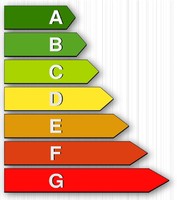What is Energy Performance Certificate and how can you acquire one

Many of you have likely seen the colour-coded energy labels on electrical appliances such as freezers, fridges and washing machines that indicate how efficient it is. Otherwise known as an energy performance certificate, you can also get them for your home to show how energy efficient the structure and the systems within are.
There are many benefits to getting an energy performance certificate (EPC) for your house, so this article will explain what an EPC is and how you can get one.
What is an Energy Performance Certificate?
If you are looking to reduce your energy bills by cutting out waste or would like to reduce carbon emissions caused by your house then getting an EPC for your house is essential. However, first, it is important to ask ‘what is an EPC Certificate?’ so you have a good grasp of what it entails before applying to get one. An EPC covers a range of areas related to your property’s energy use including total use, carbon emissions, energy efficiency, wastage and how good or bad it is for the environment.
When grading a property using an EPC it is given a colour-coded letter ranging from A to G, with A coloured in green and representing the highest level of efficiency, whilst G is coloured red and signifies the lowest level of efficiency.
To achieve an A grade rating (dark green) the property must gain between 92 and 100 points when assessed, meaning it is very energy efficient with very low energy bills. On the other end of the scale, a property that achieves 1-20 points in the assessment means it is hardly efficient at all and energy costs will be much higher. Typically, many homes are considered to have a rating of between 55 and 68 points or around the D grade.
Commercial or residential properties that are about to be sold or rented out are required to have an EPC, especially if they will have air conditioning or heating systems installed.
Why Are EPCs Important?
Getting an EPC is necessary for several reasons, these include:
- Potential buyers or renters can check how much their energy bills are likely to be.
- Current laws require properties to have an up-to-date EPC to be provided to buyers or renters.
- You can find out how to reduce the energy use and costs for your property.
Now you know the reasons why it’s important to get an EPC, it is time to look into how you can get one for your property.
Hire a Domestic Energy Assessor
The first step in obtaining an EPC is to make an appointment with a domestic energy assessor who will survey your property and give it an energy efficiency rating. To do this energy assessor’s will complete a few tasks including:
- Measuring your property
- Surveying how it was built
- Inspecting heating systems
- Checking if it has insulation
- Taking photographic evidence of everything associated with the assessment
Next, an assessor will collate and utilize all the information from the assessment in addition to building regulations from the year the property was built to create their energy efficiency report. Typically the inspection of a property will take between 30 and 45 minutes.
The EPC Register
Once an assessor completes their report and gives your property an EPC with a rating from A to G, it will be added to the EPC register where the government provides an online database of every property in the UK with an EPC.
Using the EPC register to check a property’s energy efficiency rating is simple, just visit the website and enter the property’s postcode which will bring up the overall rating, an estimation of running costs and details of what improvements could be made.
How Much Does an EPC Cost?
The cost of getting an energy performance certificate is usually around 120 pounds, however, if you shop around and go directly to an energy assessor rather than through an estate agent you are likely to find a better price. It is worth noting that an EPC for a property will be valid for 10 years after which another inspection must take place and a new EPC issued.
EPCs for Commercial Properties
Generally, any commercial property that is going to be rented out or sold must have a commercial energy performance certificate, and if the property is going to have several spaces for rent such as a block of flats then multiple EPCs will be required.
Although an EPC is a must for commercial properties, there are some kinds of buildings that are exempt, these include:
- Temporary structures that will be used for less than two years
- Buildings for religious use such as churches, mosques and temples
- Buildings that are scheduled for demolition
- Freestanding structures that aren’t used for dwelling and have a floor space of less than 50 metres squared
- Industrial buildings, workshops and non-residential buildings that use little energy
If you are a landlord planning to rent out a property then it will require an energy performance certificate with a rating of at least E according to the law. For rental properties with a rating below E, the landlord will have to make the necessary improvements to reach an acceptable energy rating of A-E.
Property Improvements to Achieve a Better Rating
Unfortunately, some properties do receive low ratings on an energy performance certificate meaning they are wasting money on energy bills and probably unnecessarily polluting the environment.
However, there are several upgrades a property owner can make to improve the energy efficiency of a building which will, in turn, result in a better rating on an EPC. Some common improvements made to buildings include:
- Adding roof and wall insulation
- Upgrading the heating system
- Installing double glazed doors and windows
- Getting a new boiler that is more energy efficient
- Wrap your boiler with insulation
- Fill cavity walls with insulation
- Add insulation to solid walls

In July 2020, the Green Homes Grant was launched by the UK government to encourage property owners to improve the energy efficiency of their buildings by offering up to £5000 in vouchers that can be used to pay for energy-saving renovations.
An energy performance certificate is vital in discovering how much energy a property is using, how much is being wasted and what the energy bills are likely to be. Acquiring an EPC can be a relatively simple process as set out in this article.


